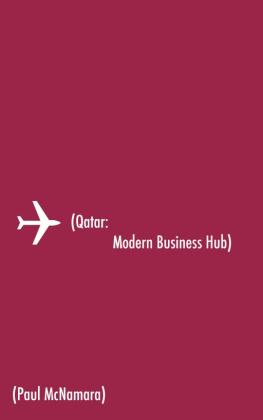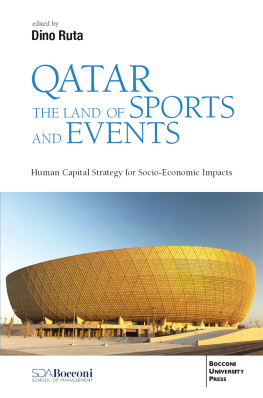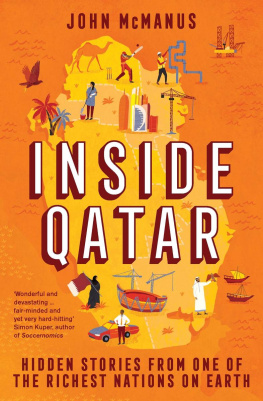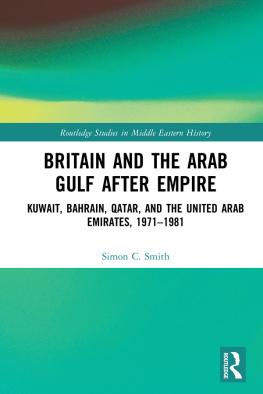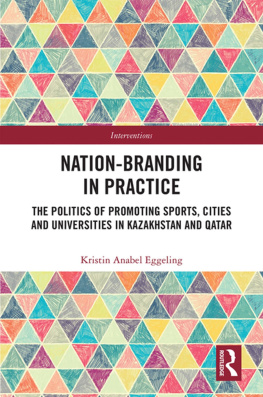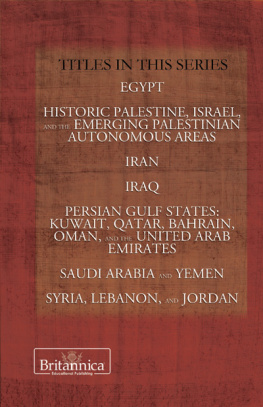Qatar: Modern Business Hub
By
Paul McNamara
Copyright
PaulMcNamara
Published byEaglemont Media, 2014
SmashwordsEdition
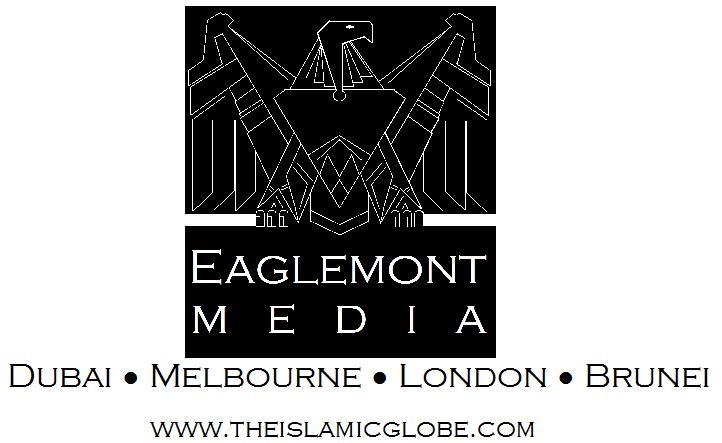
All rightsreserved.
This book maynot be lent, resold, hired out or otherwise disposed of by way oftrade in any form of binding or cover other than that which it ispublished, without the prior consent of the Publishers. Neither thepublisher nor the author make any legal representation or warrantywith respect to the contents of the book, and they do not acceptliability for any inaccuracy in the material in the book.
Qatar: reaching cruising altitude
It is oftenhand for overseas investors, both institutional and private, to getto grips with the macroeconomic picture of a country when they lookat it for the first time with a view to investing. Such investorsreally need to have in-depth knowledge of the country across abroad spectrum. It can be equally daunting for businesses lookingfor new markets to enter, prospecting for partnerships and seekingnew customer bases.
These types ofbusinesses need to understand the government, infrastructure,telecommunications and the law. They need to develop a sense of theease of doing business as well as the macroeconomic picture. On topof that they also need a thorough grounding on the key industriesand how they interplay, how they are growing, how they are copingwith extrinsic pressures and, of course, they need a sound map ofthe banking industry.
Addressingthese types of questions is the aim behind this book. The idea isto help international investors, fund managers and corporatesassess Qatar with an aim to understanding what doing business withthat country really means.
Qatar: ModernBusiness Hub shows just what a remarkable nation Qatar is. Thegrowth prospects in most areas are truly exceptional. In globalterms, Qatar would give just about any other nation a run for itsmoney. The investment climate has never looked so robust.
In The TippingPoint, Malcolm Gladwell writes, "We, are all, at heart,gradualists, our expectations set by the steady passage of time.But the world of the Tipping Point is a place where the unexpectedbecomes expected, where radical change is more than possibility. Itis contrary to all our expectations - a certainty."
There can be nodoubt that Qatar has reached its own tipping point. Investors smalland large, private and institutional are watching the Qatari marketvery closely for the next opportunity, the next wave and the nextbig thing.
Qatar isundergoing a metamorphosis on a mammoth scale. Rather like HongKong in the mid-1980s or Dubai in the late 1990s, there is analmost tangible feel of things `happening' in Qatar day and night.Of course along the way some of the old charm of Qatar is at riskof disappearing and being replaced by all that is new and modernand shiny and fresh. But that is the price of progress.
Today there aretraffic jams that would have been unthinkable 10 years ago. Thereare also headlines in the newspapers that would have been unlikely10 years ago. Partly this is the result of a newly emergent nationcoming to grips with the reality of global scrutiny: how a nationtreats its labourers in 50-degree heat says a lot about acountry.
And Qatar isrich and that can lead to jealousy: countries that failed to winthe rights to host the World Cup could point fingers and makeaccusations that are not always founded on incontrovertible proof.But the aim of this volume is not to explore these facets of Qatarbecause they will wash up one way or another, sooner or later, andbusiness will go on. Business always goes on and that is the focusof this book.
Of late therehave been signs of strain between Qatar and the other members ofthe GCC, with the United Arab Emirates detaining two Qataricitizens allegedly for spying. This is not a private spat.Al-Khaleej newspaper, based in Sharjah, reported that two Qatarishad been arrested on charges of spying in the UAE. Relationsbetween Abu Dhabi and Doha have been soured recently partly becauseof their different approaches to dealing with the rise ofIslamist movements in the region. Qatar has been reported asgiving financial and political support to the Muslim Brotherhoodwhile the UAE is hostile to the movement.
Doha says thatits support for the Muslim Brotherhood is a rational backing of apopular movement of the people while the UAE sees the movement as aradicalising force within Islam and a threat to the monarchies ofthe Gulf. Of late both the UAE and Saudi Arabia have pressuredQatar to drop support for the movement and removed theirambassadors from Doha in early 2014. The following monthmember states of the GCC agreed to end their public quarrels byagreeing to stop interference in each others business.
Its all partof the rich march of progress. One of the most startling thingsabout Hong Kong when it was on its tipping point was the electricbuzz that seemed to permeate the air. There was little thought ofthe future. Massive office blocks were still abuzz at one o'clockin the morning. Beacons of light testifying that those within werebusy doing what they liked most: making money. When a travellerstepped off a 'plane at the old Kai Tak airport in Hong Kong therewas a smell in the air and, so the saying went, it was the smell ofmoney.
That same smellgreets you as you get off the 'plane onto the tarmac at Dohas newairport. It may not be as brash and in-your-face as Hong Kong butit is there all the same.
No matter whicharea of the Qatar economy you look at, growth is all around. Thekey fundamentals of the economy look strong and foreign directinvestment looks set to grow in leaps and bounds. The economy isset to maximum speed and all of the major players there arereadying themselves for action.
Qatar is agrowth story with one of the fastest growing economies in theworld, if not the fastest. Of course the Qatar story is of one ofthe largest LNG exporters in world but it is also about the stockmarket. The region as a whole is looking stronger and stronger butin Qatar it seems as if they are not going to let other nationssteal the advantage from them. Qatar has watched Dubai and AbuDhabi bask in the limelight of international investment and it haslearned some very swift lessons.
Who would havethought that one of the biggest recruiters active in far offMyanmar would be ooredoo, formerly Qtel, Qatars telecoms giant?That is what is known as building a global brand from the groundup.
Qatar: ModernBusiness Hub is a snapshot in time of the Qatar economy and is notintended to be a definitive piece, but a work in progress that willarm the reader with a roadmap for the next few years. Of courseover the next few years much will change. It is not likely that thekey industries will change very much although naturally they willbecome more sophisticated and mature as the years march on.
Tourism, andparticularly sports tourism, is of increasing importance to theeconomy. A short wander around Dubai at any time of the day shouldbe enough to convince the sceptical observer about the importanceof regional tourism. Visitors from Saudi Arabia, the USA and Europedripping cash into the tills of the providers of luxury goods inbetween eating lavishly in expensive restaurants and staying insumptuous hotels. While the tourist industries in Paris and Londonand Sydney are tuned to perfection, the tourist market for theMiddle East as a whole is still fairly basic.
A quick look atthe international sporting calendar will show that Qatar is takingthe business of sports tourism very seriously and it is not justabout the World Cup. Qatar takes sport very seriously from thetennis open, speedboat championships, traditional sailingchampionships, fencing championships, golf championships, jet-skichampionships, cycling and more.
Next page
